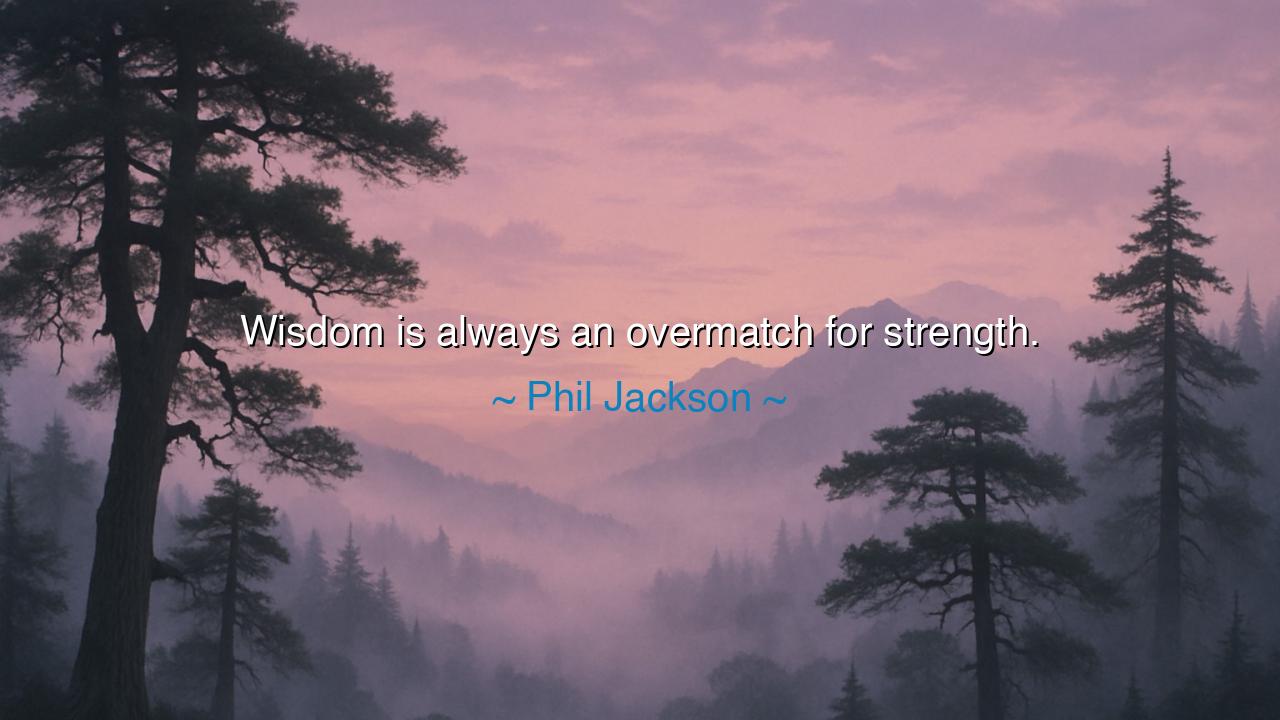
Wisdom is always an overmatch for strength.






The words of Phil Jackson — “Wisdom is always an overmatch for strength.” — resound with the cadence of the ancients, for they remind us that the mind outlives the muscle, and strategy endures when brute force fails. Strength is impressive, it dazzles the eye, it shakes the ground with its noise and might. But wisdom — subtle, quiet, enduring — bends even the strongest to its will. The boulder may crush the grass for a season, yet the grass, through patience and persistence, will split the stone.
To say that wisdom conquers strength is not to dismiss power, but to reveal its limit. Muscles grow weary, armies tire, empires crumble under their own weight. But wisdom, born of experience and reflection, is inexhaustible. It knows when to wait, when to strike, when to bend, when to stand firm. It is not a single blow but the art of many steps, carefully placed. The wise one does not outfight the strong — he outthinks him.
History bears countless witnesses to this truth. Consider the tale of David and Goliath. Goliath’s strength was unmatched, his armor impenetrable, his voice enough to terrify seasoned soldiers. Yet it was wisdom — the choice of a stone and sling over sword and shield — that brought him down. The boy who understood skill, timing, and precision conquered the giant who trusted only in brute force. Thus the story endures through millennia: wisdom is the true giant-slayer.
So too did Sun Tzu, the ancient strategist, teach that battles are won before they are fought. He declared that the greatest victory is not in endless combat but in subduing the enemy without fighting at all. This is the victory of wisdom, which manipulates terrain, morale, deception, and timing to bend strength to its own design. Armies who relied only on force often perished, but those guided by wisdom endured for generations.
Phil Jackson himself knew this truth on the field of sport. As a coach, he did not simply train bodies; he shaped minds. He taught his players that victory lay not in overpowering opponents with sheer strength, but in harnessing teamwork, patience, and awareness. His mastery of the “triangle offense” was not about raw force but about the harmony of movement, timing, and space. It was wisdom disguised as play, and it brought championships where strength alone could not.
The lesson for us is eternal: cultivate wisdom even as you respect strength. Seek learning, reflection, and discipline of the mind. In conflict, ask not only, “How can I overpower?” but also, “How can I outlast, outmaneuver, outthink?” In life, understand that patience, strategy, and insight often achieve what sheer force cannot. The wise one sees pathways invisible to the strong.
Practical wisdom follows. In your own struggles, do not rely solely on force of will, anger, or determination. These may carry you for a time but will leave you exhausted. Instead, step back. Observe. Plan. Listen. The answer that emerges from calm reflection will often be the key that brute effort could never unlock. Train your mind as much as your body; seek counsel, read deeply, learn from mistakes. For strength will one day fade, but wisdom will carry you until the end.
Thus, Phil Jackson’s words endure as a law of both the court and the cosmos: wisdom is always an overmatch for strength. The mountain may tower, but the river, with patience, carves it into valleys. The warrior may roar, but the strategist writes the final page of history. So too in your life — choose wisdom as your companion, and you will find that no strength, however mighty, can stand against it.






AAdministratorAdministrator
Welcome, honored guests. Please leave a comment, we will respond soon